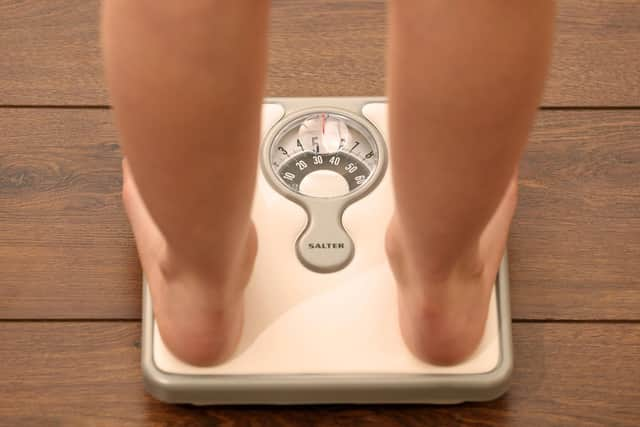Childhood obesity costs Portsmouth almost £500,000 a year
and live on Freeview channel 276
Data released recently shows Portsmouth children in 2018 were more likely to be obese than those in other parts of the country, with 12.5 per cent of four-year-olds obese - compared to 9.7 per cent nationally.
And 21.6 per cent of city 10-year-olds were classed as obese, up from the national average of 20.2 per cent.


Advertisement
Hide AdAdvertisement
Hide AdHelen Atkinson the city's director of public health, said: 'Obesity is a priority area for us as we know the serious health implications that it contributes to.
'Addressing obesity in childhood is especially important as the behaviours learnt then are harder to change as the child gets older.'
She explained that data for 2019 indicated a reduction in obesity among Reception age children and a 'minimal increase' for those in Year 6.
'The latest data brings us even closer to the national average but that's not something that we take comfort in,' she said.


Advertisement
Hide AdAdvertisement
Hide AdThe report from the National Audit Office also showed Portsmouth City Council spent £469,000 of its public health budget - or 2.5 per cent - on childhood obesity alone in 2018/19, more than the average spend for of 1.8 per cent. This works out as roughly £10.81 per child in the city.
Ms Atkinson said the council had a 'number of initiatives' to target childhood obesity including the commissioning health visitors and school nurses who provide support to families if a child is obese, and promoting national projects.
She added: 'We work closely across the council and with external partners to help make it easier for children to be a healthy weight.


'This includes projects like stomp for stamps and Pompey monster walk to school challenge and also promoting healthy balanced school meals, adventure playgrounds, parks and open spaces to make sure the council encourages children to be active and to make good food choices.'
Advertisement
Hide AdAdvertisement
Hide AdIn 2019 the idea of an obesity ‘superzone’ around city schools was first mooted, with the intention of promoting healthy eating and exercise throughout the community in that area.
However, a pilot superzone around Arundel Court School in Landport was postponed due to the pandemic.
Ms Atkinson said the public health team would 'monitor' the impact of the pandemic of childhood obesity in the city.
In the Hampshire County Council area 16.1 per cent of 10-year-olds and eight per cent of four-year-olds were classed as obese.
Advertisement
Hide AdAdvertisement
Hide AdMs Atkinson said that action was required at a national level. 'Childhood obesity is complex, and needs action at every level - nationally in terms of government policy, action by the food industry to improve affordable healthy choices and a ban on advertising unhealthy choices to children as well as the local actions we deliver in our schools and local communities,' she said.
'I would encourage further initiatives from central government to ensure that we can incentivise providers to produce and offer healthy food in all settings. Ultimately to shift the balance to people living healthier lifestyles we need to make it easy for people to make better choices around diet and exercise.'
It is estimated that the annual cost towards the treatment of obesity-related conditions in England costs the NHS £6.1bn.
How we can tackle childhood obesity in Portsmouth
'WE NEED to address poverty and food inequality.'
Senior lecturer in sport, health and exercise science at the University of Portsmouth, Paul Gorczynski, said that the city's growing obesity problem had its roots in poverty.
Advertisement
Hide AdAdvertisement
Hide AdMr Gorczynski said: 'This is a complicated problem. It's reflective of increasing poverty in Portsmouth and the increasing disparity between rich and poor.
'We need a poverty action plan that works out how we are going to create more opportunities for families to have incomes necessary to address food inequality.
'If people are living in poverty they have less opportunity to buy food that's of high quality. There's also the consideration of food availability - what kind of food is actually available in the areas people live? Can people get themselves to the supermarket where there is greater variety?
'And are they dependant on time? People won't have the time to engage in the latest Jamie Oliver or Nigella recipe which could mean ready-made meals are used and these are calorie-rich.'
Advertisement
Hide AdAdvertisement
Hide AdBefore the pandemic, Portsmouth was ranked the 59th most deprived local authority out of 326 in England in government statistics.
The city is broken down into 125 areas by statisticians – and 15 are within the most deprived 10 per cent in England.
Eight of these areas are in Charles Dickens ward and the rest are in Paulsgrove, Nelson and Fratton and St Thomas.
'I think what we are going to see in years to come will be a direct result of the poverty this pandemic is going to cause,' Mr Gorczynski said.
Advertisement
Hide AdAdvertisement
Hide Ad'The first place we are going to see it is around people's weight. Already we have seen an uptake in people in people using food banks during the pandemic. This is something that doesn't happen overnight but its effects will be long lasting.'
He explained that poverty has an impact on people's ability to exercise.
He added: 'Children learn from their parents. If parents are stressed about money and food and don't have time for exercise children pick up on that.
'It is also about urban design in Portsmouth and whether people have the opportunities to get somewhere like a park to exercise.
Advertisement
Hide AdAdvertisement
Hide Ad'I would encourage the council to really lobby the government for support in addressing poverty. The superzone idea is great, but what are they going to do about poverty? What are they going to do to improve incomes?'
A message from the Editor, Mark Waldron
You can subscribe here for unlimited access to Portsmouth news online - as well as fewer adverts, access to our digital edition and mobile app.
Our trial offer starts at just £2 a month for the first two months.
Comment Guidelines
National World encourages reader discussion on our stories. User feedback, insights and back-and-forth exchanges add a rich layer of context to reporting. Please review our Community Guidelines before commenting.